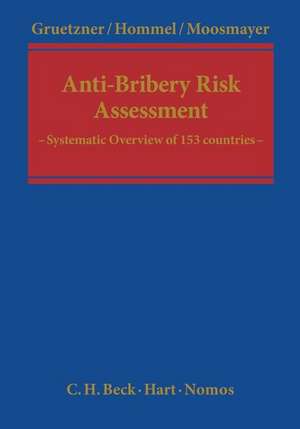Anti-Bribery Risk Assessment: A Handbook
Editat de Thomas Gruetzner, Ulf Hommel, Klaus Moosmayeren Limba Engleză Hardback – 19 ian 2011
Preț: 1746.18 lei
Preț vechi: 2030.44 lei
-14% Nou
Puncte Express: 2619
Preț estimativ în valută:
334.24€ • 363.18$ • 280.94£
334.24€ • 363.18$ • 280.94£
Carte disponibilă
Livrare economică 31 martie-14 aprilie
Preluare comenzi: 021 569.72.76
Specificații
ISBN-13: 9781849461290
ISBN-10: 1849461295
Pagini: 500
Dimensiuni: 171 x 234 x 39 mm
Greutate: 0.96 kg
Editura: Bloomsbury Publishing
Colecția Beck/Hart
Locul publicării:London, United Kingdom
ISBN-10: 1849461295
Pagini: 500
Dimensiuni: 171 x 234 x 39 mm
Greutate: 0.96 kg
Editura: Bloomsbury Publishing
Colecția Beck/Hart
Locul publicării:London, United Kingdom
Notă biografică
Dr Thomas Gruetzner practises law with Baker & McKenzie in Munich.Dr Ulf Hommel works as in-house counsel and Dr Klaus Moosmayer as Chief Counsel, Compliance, both with Siemens, Munich. The authors are well-known experts in the field of compliance in the countries covered in this work.
Cuprins
The book and the CD-ROM cover 153 countries worldwide focussing on the following nine questions:1. What is the ceiling beyond which advantages granted to public officials in the context of contractual negotiations become impermissible? What is commonly considered to be a socially acceptable and legally unproblematic advantage?2. Who qualifies as a public official? Are government-controlled enterprises also included?3. Does culpability arise only in cases in which a public official breaches his official duties, or can there be culpability also in cases in which a public official obtains any advantage in connection with a permissible official act?4. What is the ceiling beyond which advantages granted to private sector business associates in the context of contractual negotiations become impermissible? What is commonly considered to be a socially acceptable and legally unproblematic advantage?5. How can differences between the answers to Question 1 and 4 (benefits obtained by public officials/private sector business associates) be summarized?6. Many advantages be granted to a potential (in the absence of contractual negotiations) public or private sector business associate? (So-called "priming the pump").7. Do corruption regulations apply solely to domestic businesses or also to foreign business entities?8. Can legal entities be liable for prosecution? If not, what other possible sanctions might be imposed in a business (forfeiture/monetary fine/confiscation of profits/barring of contract awards)?9. Can officials of a business also be held personally liable for criminal penalties or monetary fines?
Descriere
This book provides an overview of the legal framework and practices of implementation in over 150 countries, based on a uniform questionnaire.
